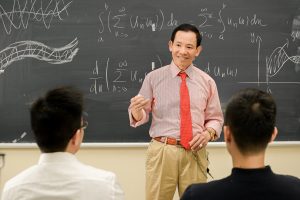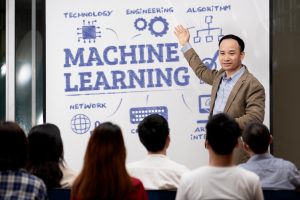The studying environment in the School of Applied Mathematics and Informatics
- Studying seriously, vibrantly and creatively
- Enthusiastic teachers
- Enthusiastically consultation to help students study better
- Many exciting and useful playgrounds. Positive and meaningful social activities.
- Taking part in doing scientific research
- Practical experience in organizations, enterprises
- Various opportunities to study abroad
What majors does the School of Applied Mathematics and Informatics train?
Currently, the School of Applied Mathematics and Informatics has 3 undergraduate training programs majoring in Mathematics-Informatics and 1 training program in Management Information Systems, including
- Bachelor of Engineering in Applied Mathematics (4 years)
- Applied Mathematics and Information Engineer (5 years)
- Talented Engineer in Applied Mathematics (5 years)
- Bachelor of Engineering in Management Information Systems (4 years)
(The new Management Information System bachelor’s program has been built and enrolled since 2016. This program has been reopened and updated from the Management Informatics program that the Institute has successfully trained from K41 to K48).
After graduating from university, students can continue to study Postgraduate at the Institute. Postgraduate training programs include:
Master in Specializations:
- Applied Mathematics
- Mathematical foundations for informatics
Doctorate in Specializations:
- Mathematical foundations for informatics
- Probability theory and mathematical statistics
- Applied Mathematics
- Calculus
- Differential and integral equations
The characteristics of the Math-Informatics major
Students are equipped with knowledge in both fields of Informatics and Applied Mathematics, trained in logical thinking, strategic thinking, cognitive ability, and organizational and management skills.
In computer science, students are equipped with the knowledge and practical skills to be able to meet the work of a software engineer and programmer.
In mathematics, students are trained in logical thinking and are provided with methods and tools used to model and solve practical problems in statistics, analysis, forecasting, simulation, etc.
With knowledge of applied mathematics, software engineers with a degree in Applied Mathematics have an advantage when building computer programs where real problems require high mathematical models and algorithms, such as analysis: financial analysis in the bank; network planning/optimization in telecommunications and traffic; stock market forecast; flood forecasting; investment appraisal; insurance appraisal; scientific computing and simulation systems, etc.
With the mathematical tools and informatics equipped, graduates gain comprehensive knowledge. They can be computer experts or math experts. There are jobs that they have a special advantage when recruiting such as financial forecast analyst (quant), actuary, planning specialist, etc
What will Mathematics – Informatics students learn in the training program?
The training program for bachelors and engineers in Mathematics – Informatics major aims to train students to get the correct mathematics, algorithmic mindset and scientific approach to solve problems arising from fields of science, technology and life such as Security, communication, economics, finance, scientific computing and simulation, industry, agriculture, irrigation, geology, construction, transportation, astronomy, science education, entertainment,…
Students are equipped with basic and in-depth knowledge of mathematics and informatics to be able to continue their intensive study in Applied Mathematics and Computer Science – a specialization in Information Technology.
- Basic and in-depth knowledge of mathematics and applied mathematics, which enables students to continue their intensive study of applied mathematics, such as functional analysis, general algebra, and statistical probability, optimization methods, financial mathematics, partial differential equations, complex analysis, optimal control, data analysis, simulation models of ecosystems,…
- Knowledge and practical skills in computer science such as programming techniques, operating systems, databases, data structures and algorithms, systems analysis and design, cryptography and computational complexity computing, computer security, computer graphics, networks and computer systems, 3D programming,…
Besides, students also practice soft skills such as:
- Organizational skills, leadership and independent work as well as teamwork
- Capable of adapting changes in computational science and technology
- Ability to think independently and creatively, the ability to find motivation to study and work.

Output standards-expected results of Bachelor of Engineering Mathematics-Informatics ?
After graduating, a bachelor of Mathematics- Informatics graduated from Hanoi University of Science and Technology must have:
- Basic and in-depth knowledge of Mathematics, Applied Mathematics and Informatics to meet the specific tasks of the interdisciplinary Math-Informatics and related majors:
- Ability to apply knowledge of Mathematics, Informatics and basic science to describe, calculate and simulate, manage systems, technological processes, build application software;
- Ability to apply basic and specialized knowledge of Mathematics-Informatics to research, analyze and bring up solutions to a number of problems in Engineering, Industry, Economics, Finance, etc.
- Ability to establish theoretical foundations of problems, typify mathematics, and to seek ways to solve problems in diverse and ever-changing fields of scientific reality and socio-economic life.
- Professional skills and qualities required to be succeed in career:
- Ability to think analytically, design and build computational systems, management information as well as application software programs to solve problems of Mathematics and Informatics arising in practice;
- Ability to experiment, research and discover knowledge;
- Systematic thinking and critical thinking;
- Dynamic, creative and serious;
- Ability to adjust, adapt to many different application fields and adapt to the development of computational science and technology;
- Morality and professional responsibility;
- Understanding contemporary issues and lifelong learning consciousness.
- Social skills needed to work effectively in multidisciplinary teams and in an international environment:
- Organizational, leadership and teamwork skills (multidisciplinary and international);
- Effective communication skills, skills in writing, presenting, discussing, negotiating, mastering situations, effectively using modern tools and means;
- Effective use of English skills at work (TOEIC score ≥ 450);
- The ability to integrate, the will to rise up and the ability to self-improve education and professional skills.
- Ability to think analytically, design, build, develop projects and products applied Mathematics and Information Technology:
- Ability to build and develop projects, systems as well as solutions and products applying Mathematics and Information Technology according to the actual needs of a number of scientific and technical problems, Economics, Finance, Management, etc.
- Ability to teach and research Applied Mathematics and Informatics in universities, colleges and research institutes;
- Possibility to continue to pursue graduate studies (Master’s and Doctorate) in Mathematics, Mathematics-Informatics and Information Technology, Economics and some other sciences.
- Excellent political qualities and sense of serving individuals, having good health, meeting the requirements of national construction and defense:
- Having a degree in political theory according to the general program prescribed by the Ministry of Education and Training;
- Possessing a Certificate of Physical Education and a Certificate of National Defense-Security Education according to the general program prescribed by the Ministry of Education and Training.
What can Math-Informatics students do?
Mathematics-Informatics graduates can:
- Building and securing information systems
- Developing utility software, such as image processing software, data encryption, data compression, etc.
- Developing smart webs and mobile applications
- Programming games
- Building and managing computering projects
- Analyzing and forecasting gold prices, stocks, floods, risks, ….
- Appraising investment, appraising insurance,…
- Aggregating statistics
- Building mathematical models and developing scientific computing software, application software in the fields of finance, economics, insurance, statistics, science, …
- Researching and teaching Applied Mathematics and Informatics
Which job do students majoring in Mathematics-Informatics do after graduation?
Graduates of Mathematics-Informatics Major can work in many industries that use applied mathematics and informatics knowledge, such as:
- System Analyst
- Software engineer
- Informatics expert
- Statistician
- Mathematician
- University lecturers
- …
Where do students majoring in Mathematics-Informatics work after graduation?
Exactly like the career orientation set out, according to actual survey data, former Math-Informatics students often work at:
Research institutes, universities, etc.
Banks, insurance, financial corporations, etc.
Software corporations, post and telecommunications,…
Studying abroad when you are post – graduate student or work at businesses, companies, universities abroad
Can students participate in scientific research?
Every year, the School of Applied Mathematics and Informatics organizes the Conference of Scientific Research Students according to the University’s program. Many students of the School have won high prizes at the School level and the Ministry of Education level.
In addition, the Union Branch of the School organizes a contest for students doing scientific research with the topic Computer Games, in order to create motivation and opportunities for students to apply mathematical knowledge, theoretical informatics, programming skills to build software.
NCKH research activities have brought about many practical benefits to students, specifically:
- Consolidating, synthesizing and developing acquired knowledge;
- Exploring the most topical theoretical and technological issues; the most modern in mathematics and computer science;
- Be more enthusiastic and interested in learning;
- Training thinking methods, presentation methods and initially building working skills, independent NCKH research;
- More stable, more confident in real life;
- Well preparing for students’ real jobs after graduation.
What are the opportunities to study abroad for Math-Informatics students?
Math-Informatics students have many opportunities to receive scholarships for undergraduate and graduate studying abroad. The percentage of students receiving scholarships to study abroad for talented engineers in Mathematics is the highest among all Majors of talented and high-quality engineers.
Union activities and movements of students of the School of Applied Mathematics and Informatics?
- Discover more about Union Branch of Mathematics :
http://sami.hust.edu.vn/sinh-vien/lien-chi-doan/
- Discover more about Union Branch of Mathematics:
